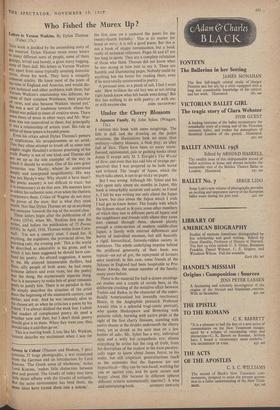Under the Cherry Blossom
I OPENED this book with some misgivings. The title is dull and the drawing on the jacket atrocious; the illustrations look no more than ordinary—cherry blossom, a Noh play, an alley full of bars. There have been so many misin- formed, opinionated, pale or gushing books about Japan (I except only D. J. Enright's The World of Dew, and even that has odd bits of strange per- spective) that I was prepared to be both bored and irritated. The 'magic' of Japan, which the blurb talks about, is apt to go sticky on paper.
But I was wrong. Although Mr. Sykes and his wife spent only about six months in Japan, this book is remarkably accurate and acute; as I read it, I felt he was writing not only about the Japan I knew, but also about the Japan which I wish I had got to know better. The family with which the Sykeses stayed in Kyoto, some other members of which they met in different parts of Japan, and the neighbours and friends with whom they came into contact through them, showed plainly enough a cross-section of modern middle-class Japan; a family with internal differences ,and bursts of individual emotion, but still basically a rigid, hierarchical, formula-ridden society in miniature. The whole underlying impulse behind the proffered generosity. of their hosts was typical—an act of girl, the repayment of favours once received; in this case, some friends of the Sykeses in England had been hospitable to Pro- fessor Awada, the senior member of the family, many years before.
There is the material for half-a-dozen sociologi- cal studies and a couple of novels here, in the deliberate crushing of the tentative affair between Toshio and Reiko, in the character of the super- ficially Americanised but inwardly reactionary Shozo, in the Anglophile patriarch Professor Awada (this is a splendid tragi-comic portrait), who quotes Shakespeare and Browning with pedantic relish, bursting with native pride at the sight of the first cherry blossom, scowling with native shame at the drunks underneath the cherry trees, yet as drunk as the next man on a few 'bottles of sake. Mr. Sykes has a wry, individual style and a witty but sympathetic eye; almost everything he writes has the ring of truth, from his description of the student in the train paralyti- cally eager to know about James Joyce, to his wider, but still empirical, generalisations (such as the statement that the Japanese are not hypocritical—`they can be two-faced, working for you or against you, and be quite secure and happy about this because in different spheres different criteria automatically operate'). A wise


































 Previous page
Previous page